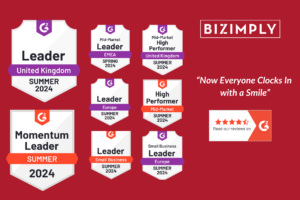In the competitive work environment, retaining top talent is a priority for any business, particularly in industries that rely on shift-based work. A business that has an extremely high turnover is likely doing something wrong.
Scheduling software has proven to be a powerful tool in addressing many of the challenges that lead to high turnover, such as unfair shift distribution, poor communication, and a lack of work-life balance. Without hospitality tech, you’re putting yourself at an immediate disadvantage.
Businesses, particularly those in the hospitality space, can foster a more engaged, satisfied, and loyal workforce by automating scheduling tasks, providing flexibility, improving transparency, and empowering workers to manage their own time.
Businesses that prioritise smart scheduling practices are well-positioned to succeed in both retaining their best employees and driving long-term success.
Providing Schedule Flexibility
Flexibility has become one of the most sought-after benefits for employees, particularly in industries like hospitality, retail, and healthcare, where shifts can vary widely. Providing schedule flexibility has a direct impact on employee retention, as it helps workers maintain a healthy work-life balance, accommodate personal responsibilities, and reduce burnout.
The Growing Demand for Flexibility
Over the past decade, there has been a marked shift in employee expectations regarding working hours. According to numerous studies, employees are no longer just looking for competitive salaries—they want control over when and how they work.
Flexibility is especially important for younger generations entering the workforce, who place high value on balancing their professional and personal lives.
Scheduling software enables businesses to offer the kind of flexibility employees crave by allowing workers to have input into their schedules. This not only improves employee satisfaction but also makes the workplace more attractive to prospective hires, reducing turnover and boosting retention.
Benefits of Flexible Scheduling
Providing flexible scheduling through software has numerous benefits that directly contribute to employee retention:
- Work-Life Balance: Employees who have greater control over their schedules can better balance work with their personal lives, leading to higher overall job satisfaction. A happy, well-balanced employee is more likely to stay with the company long-term, reducing turnover rates.
- Reduced Stress and Burnout: Scheduling flexibility reduces the stress of juggling personal responsibilities with rigid work schedules. Employees who feel less stressed are not only more productive but also more likely to stay in their jobs rather than look for work elsewhere.
- Higher Engagement and Productivity: Flexibility fosters a sense of empowerment and trust. When employees feel that their work schedules are fair and respectful of their time, they are more engaged at work and motivated to perform well.
Reducing Scheduling Conflicts and Errors
There is nothing worse than having to deal with an unforeseen scheduling conflict. Scheduling conflicts and errors are some of the most common sources of frustration for employees, especially in industries like hospitality, retail, healthcare, and other shift-based work environments.
Inconsistent hours, double bookings, last-minute changes, and unaccounted availability can cause stress, lower morale, and contribute to high turnover rates.
One of the significant ways scheduling software boosts employee retention is by effectively reducing these conflicts and errors, creating a more stable and predictable work environment.
Positive Impacts on Employee Retention
Reducing scheduling conflicts and errors through automated software leads to numerous benefits that contribute directly to employee retention:
- Predictability and Stability: Employees value a predictable work schedule that allows them to plan their personal lives effectively. By minimising scheduling errors and last-minute changes, businesses can offer their employees greater predictability, which in turn increases job satisfaction and reduces the desire to leave.
- Building Trust and Transparency: When employees feel that their schedules are being handled fairly and accurately, it builds trust between them and management.
- Lowering Stress Levels: Uncertainty and last-minute changes in schedules can be a major source of stress for employees. By eliminating conflicts and errors, scheduling software reduces this stress, creating a more positive work environment.
- Improved Communication: The instant communication features provided by scheduling software (such as mobile notifications and real-time updates) ensure that employees are always in the loop about their schedules.
- Enhanced Manager Efficiency: When scheduling becomes a seamless process for managers, they have more time to focus on team development and employee engagement.
Improving Communication and Transparency
We all know communication is the key to any good relationship, and it’s no different in the workplace. Effective communication and transparency are critical for building trust and maintaining a positive relationship between employees and management.
In industries with irregular schedules, such as hospitality, communication around shifts, time-off requests, and availability is essential for smooth operations.
Scheduling software plays a pivotal role in enhancing this communication by streamlining the process and fostering a transparent work environment, which leads to improved employee satisfaction and retention.
The Importance of Communication in the Workplace
Communication is at the heart of any successful team. When employees feel heard and know that they can communicate their needs easily, they are more likely to be engaged and committed to their roles. In the context of scheduling, effective communication means:
- Clarity on Shift Assignments: Employees need to know when they are scheduled to work well in advance so that they can plan their personal lives around their work commitments.
- Availability of Shift-Related Information: Whether it’s communicating about an open shift, a change in availability, or a time-off request, employees need to have easy access to scheduling information to stay informed and engaged.
- Immediate Updates on Changes: In industries where shift schedules can change rapidly, employees need to be informed of any updates or changes as soon as they occur.
How Scheduling Software Improves Communication
Scheduling software revolutionises how managers and employees communicate around shift schedules by offering real-time updates, automated notifications, and a centralised platform for all scheduling-related communication. A few key ways in which it does this is as follows:
- Real-Time Notifications: Scheduling software provides real-time notifications to employees about their schedules, shift changes, or open shifts that need to be filled. These notifications can be sent via email, text, or through a mobile app, ensuring that employees are always informed of their upcoming shifts.
- Centralised Communication Hub: Many scheduling platforms feature an in-app messaging system or integration with communication tools, allowing employees and managers to communicate directly within the system.
- Visibility Into Scheduling Processes: Employees can view their schedules, availability, and shift preferences directly through the software. Manager-to-Employee Communication: Managers can easily send announcements, shift requests, or reminders to the entire team or individual employees through the scheduling platform.
The Impact on Employee Retention
Improving communication and transparency through scheduling software leads to numerous positive outcomes for both employees and businesses, ultimately leading to improved retention:
- Increased Trust and Morale: When employees feel that scheduling decisions are made fairly and transparently, it builds trust in the workplace.
- Reduced Confusion and Stress: Clear and consistent communication about schedules and shift changes reduces confusion and eliminates the stress of uncertainty.
- Higher Employee Engagement: Effective communication about schedules fosters a sense of engagement and inclusion.
- Improved Manager-Employee Relationships: Managers who use scheduling software can communicate more effectively with their teams, which helps build stronger, more positive relationships.
- Lower Absenteeism and Tardiness: When employees are clearly informed about their schedules and any updates, absenteeism and tardiness are reduced.
Upholding Fairness in Shift Distribution
A fair workplace is a happy workplace. Fairness in shift distribution is another incredibly important factor in employee morale, particularly in industries that rely heavily on shift work, such as hospitality, retail, healthcare, and other service-based sectors.
When employees perceive that shifts are distributed equitably, they are more likely to feel valued, motivated, and committed to their work. However, manual scheduling systems often lead to real or perceived favouritism, inconsistency, and unfair allocation of shifts, which can negatively impact morale and increase turnover.
Scheduling software helps address these concerns by automating the scheduling process, and ensuring that shifts are distributed fairly based on transparent rules, preferences, and available hours.
The Impact of Perceived Fairness on Employee Morale
Fairness in the workplace is a cornerstone of employee engagement and satisfaction. When employees believe that they are being treated fairly—whether in terms of pay, opportunities, or scheduling—they are more likely to feel respected and motivated. In contrast, perceived unfairness can quickly lead to frustration, resentment, and disengagement.
- Perceived Favouritism: When certain employees are consistently given better shifts (e.g., more favourable hours, more weekend time off), it can create the perception of favouritism. This can cause friction between employees and management, and between employees themselves, leading to a toxic work environment.
- Inconsistent or Unreliable Hours: If employees feel that their hours are inconsistent or unpredictable, it can lead to dissatisfaction. For hourly workers, in particular, this can directly affect their income, and they may feel that they are not getting a fair share of available shifts.
- Reduced Motivation and Engagement: When employees don’t feel like they are being treated fairly in terms of shift distribution, their motivation to perform well may decline.
- Workplace Tension: Unfair scheduling practices can also cause tension and resentment among employees. If certain individuals feel that they are consistently given undesirable shifts, such as night shifts or weekends, while others are regularly given more favourable hours, it can lead to internal conflict.
Benefits of Fair Scheduling on Employee Retention
Maintaining fairness in scheduling has a direct and positive impact on employee retention. When employees feel that their shifts are distributed fairly and that their preferences and availability are considered, they are more likely to remain loyal to the company. Fair scheduling improves retention in the following ways:
- Increased Job Satisfaction: Fair scheduling leads to higher levels of job satisfaction, as employees feel that they are being treated equitably. Satisfied employees are less likely to seek other job opportunities and are more likely to stay with the company for the long term.
- Stronger Workplace Relationships: Fairness in scheduling reduces conflict and tension among employees, leading to stronger workplace relationships. When employees believe that shifts are distributed fairly, they are less likely to feel resentment toward their colleagues.
- Improved Employee Morale: Employees who feel that they are being treated fairly in terms of shift allocation are more motivated to perform well and remain engaged in their roles. High morale contributes to a more productive workforce, reducing absenteeism and turnover.
- Reduced Turnover Due to Burnout: Scheduling fairness prevents certain employees from being overburdened with too many shifts, particularly undesirable or irregular ones. By ensuring that shifts are distributed evenly, businesses can reduce burnout, which is a leading cause of turnover in shift-based industries.
- Attracting and Retaining Talent: Fair scheduling practices make businesses more attractive to prospective employees. Workers are more likely to apply for and stay at companies that offer transparent, equitable scheduling processes, as they know their time and preferences will be respected.
Enhancing Work-Life Balance
Work-life balance has become a critical factor for employees when deciding whether to stay with a company or seek opportunities elsewhere.
In industries that rely on shift work, such as hospitality, retail, healthcare, and customer service, achieving a healthy work-life balance can be particularly challenging due to irregular hours, unpredictable schedules, and the need for employees to be available during peak periods.
Scheduling software plays a key role in helping employees maintain this balance by providing them with more control over their schedules, offering greater flexibility, and reducing the stress that comes with managing personal and professional commitments.
The Importance of Work-Life Balance in Employee Retention
Work-life balance is essential for employee well-being. Workers who feel that their personal and professional lives are in harmony are more likely to be satisfied with their jobs, perform better, and remain loyal to their employers.
Conversely, poor work-life balance can lead to stress, burnout, and a desire to leave the organisation in search of a more accommodating environment. Here are some key reasons why work-life balance is so important for retention:
- Reduced Stress and Burnout: Employees who are constantly juggling work and personal responsibilities without sufficient control over their schedules are at a higher risk of burnout. Burnout not only affects their performance but also leads to higher turnover rates as employees seek relief from overwhelming stress.
- Improved Mental and Physical Health: Maintaining a healthy work-life balance has a direct impact on an employee’s mental and physical health. Workers who can balance their time between work, family, hobbies, and rest are less likely to experience stress-related illnesses and are generally more satisfied with their job.
- Increased Job Satisfaction: Employees with a good work-life balance tend to have higher levels of job satisfaction. They are more likely to be engaged and productive at work because they are not constantly preoccupied with personal obligations that conflict with their work schedules.
- Stronger Employee-Employer Relationships: Companies that actively support work-life balance foster a sense of trust and goodwill with their employees. Workers feel valued and respected when their employer takes steps to accommodate their personal needs, which strengthens the employee-employer relationship and reduces turnover.
Benefits of Work-Life Balance on Employee Retention
Improving work-life balance through scheduling software has numerous benefits for employee retention. When employees feel that their work schedules are designed with their well-being in mind, they are more likely to remain with the company and perform at their best. The key ways work-life balance contributes to retention is as follows:
- Higher Employee Engagement: Employees who can effectively balance their personal and professional lives are more engaged at work. They are less distracted by personal concerns and more focused on their tasks, leading to higher productivity and job satisfaction.
- Reduced Absenteeism: When employees can schedule their time off in advance and swap shifts when necessary, they are less likely to miss work unexpectedly. This reduces absenteeism, as employees can manage their commitments without disrupting their work schedules.
- Decreased Burnout: Work-life balance is a key factor in preventing burnout, which is a major cause of turnover, especially in industries with irregular hours. Scheduling software helps prevent burnout by giving employees more control over their schedules and ensuring that they are not overworked.
- Improved Loyalty and Commitment: Companies that prioritise work-life balance through flexible and predictable scheduling practices build loyalty and commitment among their employees. Workers are more likely to stay with a company that values their time and takes steps to accommodate their needs.
- Better Recruitment and Retention: Offering a good work-life balance makes a company more attractive to potential employees, especially in competitive industries where workers may have multiple options.
Why Choose Bizimply?
Bizimply is an incredibly intuitive and robust workforce management software solution designed for businesses in industries such as hospitality, retail, and healthcare, where shift-based work and employee scheduling are essential.
It simplifies the management of employee schedules, time tracking, attendance, and performance, all from a single platform.
Bizimply focuses on improving operational efficiency and employee engagement, particularly in sectors with high employee turnover – giving businesses the tools to streamline day-to-day tasks, and allowing managers to focus on people rather than paperwork.
Key Features of Bizimply
- Employee Scheduling: Bizimply offers an intuitive scheduling tool that allows managers to create, adjust, and share work schedules quickly. Employees can view their shifts in real time, reducing scheduling conflicts and last-minute changes.
- Time & Attendance Tracking: With its time clock feature, Bizimply tracks when employees clock in and out, maintaining accurate data for payroll and compliance with labour laws. It also prevents time theft and promotes punctuality.
- Payroll Integration: Bizimply integrates with various payroll systems, simplifying the payroll process by automatically calculating employee hours, including overtime and holiday pay. This minimises errors and administrative burdens.
- Employee Database & HR Management: It serves as a central hub for storing and managing employee records, contracts, qualifications, and other HR-related data, all easily accessible.
- Reporting & Analytics: Bizimply provides detailed reports and analytics on labour costs, staff performance, and hours worked. These insights help managers make data-driven decisions to optimise labour and control costs.
What Makes Bizimply Stand Out?
- Industry Focus: Bizimply caters to industries with complex scheduling needs, such as hospitality and retail, offering tailored solutions that address specific pain points like shift management, multi-location staff coordination, and labour compliance.
- Ease of Use: Bizimply’s user-friendly interface and mobile accessibility ensure that both managers and employees can easily navigate the platform, reducing friction in adoption. Managers can create schedules in minutes and adapt quickly to last-minute changes.
- Compliance & Accuracy: Bizimply helps businesses comply with local labour laws, including time tracking and ensuring accurate payroll calculations. Its integration with payroll systems reduces the risk of human error, which is often a major issue in manual workforce management processes.
- Employee Engagement: One of Bizimply’s standout features is its ability to foster better communication and engagement with staff. With access to schedules via mobile, real-time notifications, and the ability to communicate time-off requests or shift changes easily, employees feel more in control and informed about their work environment.
How Bizimply Improves Employee Retention
- Better Scheduling: Transparent, accessible scheduling reduces the likelihood of disputes and confusion, leading to happier employees who experience less stress around their working hours.
- Work-Life Balance: Employees can submit requests for time off or shift preferences, enabling a more balanced schedule that fits their personal needs. When employees feel that their work-life balance is respected, retention rates improve.
- Recognition & Development: With features like performance tracking and reviews, Bizimply allows managers to recognise and reward high-performing employees. Regular recognition and career development opportunities keep employees motivated and engaged.
- Improved Communication: The mobile app, Bizimply Connect, and real-time updates ensure employees always have access to the latest information about their shifts, requests, or any changes. With improved communication, misunderstandings are reduced and the overall employee experience is enhanced.
Final Thoughts
Implementing scheduling software can be a game-changer for improving employee retention. By offering flexibility, transparency, and streamlined communication, these tools create a more organised and balanced work environment that employees appreciate.
The ability to easily manage shifts, access schedules remotely, communicate clearly and avoid scheduling conflicts reduces stress and fosters a sense of fairness and control over their work lives.
As businesses continue to prioritise employee satisfaction, investing in scheduling software is a practical step toward keeping valuable team members engaged and loyal for the long term.
At Bizimply, we provide powerful and feature-rich shift management and scheduling software, specifically designed to benefit hospitality businesses. Reach out today for more information or book a demo.









